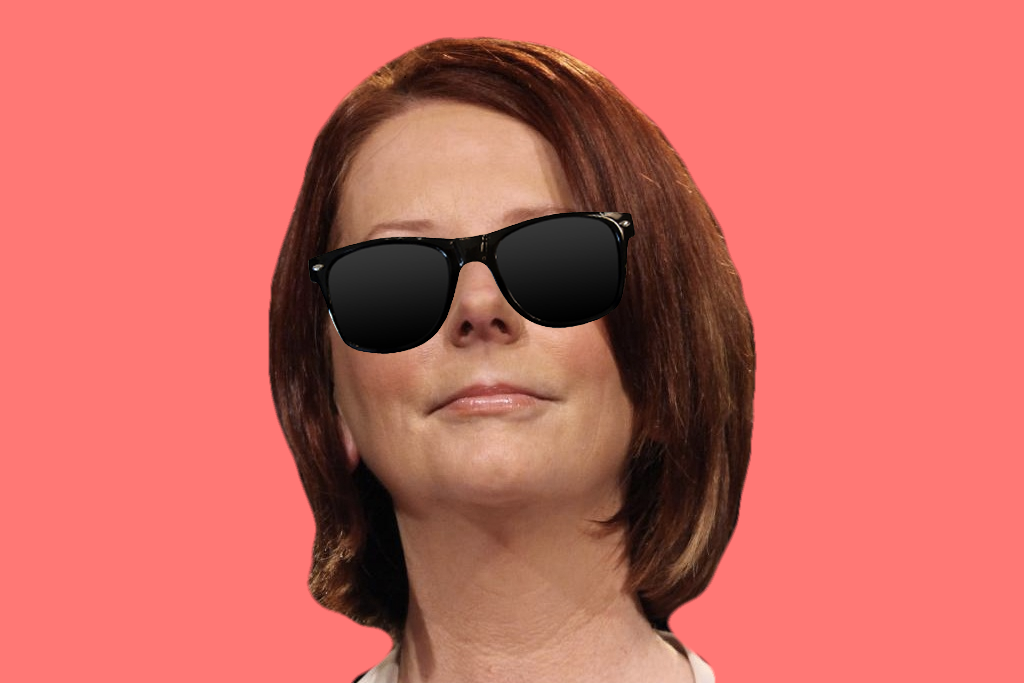Friendly Reminder: Julie Bishop Is Not Your Feminist Woke Bae
Julie Bishop has only found her voice now that she's lost the power to actually do anything.

Julie Bishop — respected former Foreign Affairs Minister, most popular Liberal politician in the country, and owner of the most terrifying death stare in Parliament — is having a moment.
Bishop, who has toed the party line so carefully that her shoes are permanently pointed towards Liberal Party HQ in in Canberra, is finally speaking out about the Liberal Party’s ‘toxic culture’ and problem with women.
In a wide-ranging interview with 60 Minutes on Sunday, Bishop spoke about the potential benefits of having more women in the party room, providing a gentle dig at ex-PM Tony Abbott, who infamously had just one woman — Bishop — in his first cabinet.
“I was much more comfortable when there were more women in the cabinet,” she said. “The discussion and the content and the tenor of the debate is vastly different when more women are involved.”
She’s also spruiking quotas to ensure more female representation — something that the Labor Party has had plenty of success with, but the Liberals have point blank refused to consider.
“No nation can reach its potential unless it embraces the talents and abilities and skills and ideas of the 50 per cent of the population that is female,” she told interviewer Chris Uhlmann. “I believe that targets are an appropriate mechanism. It’s not the only mechanism but I have seen it work elsewhere.”
Bishop is well placed to make these comments — as deputy Liberal leader for nine years, Foreign Affairs Minister for five years and a member of parliament for 20 years, she has undoubtedly been one of the most stabilising figures in an era fraught with reactionary change and political tantrums.
Where Have You Been All My Life?
While it might not quite be a roar, Bishop’s comments are the latest in a burst of tweets, quotes and interviews about her party’s problems. But those calling Bishop their new political bae or cheering on her ‘wokeness’ are perhaps tooting Bishop’s horn a bit too early. While her challenge to the party establishment is welcome, why has it taken so long for her to speak up in defence of her gender?
It’s a bit baffling considering the efforts Bishop has gone to in the recent past to back her party’s behaviour — the same behaviour she’s now calling out as bullying. After then-Prime Minister Julia Gillard’s world-famous misogyny speech, Bishop attacked her, calling the speech a “vile slur” against its target, her boss at the time, Abbott.
“She should apologise to the women in Tony Abbott’s life, and she should withdraw it,” she said. “Would women around the world be applauding if they knew her speech was in defence of the indefensible?”
Then there’s her legendary ‘death stares’, which became meme-worthy years ago, but are in fact a weapon used to make her opposition, whether that be politicians or journalists, squirm in their seats.
Perhaps most notably, Bishop has also wholeheartedly rejected the label of “feminist”. In 2014 at the launch of Canberra’s branch of Women in Media, she also declared that she had never faced the ‘glass ceiling’.
“I don’t find the need to self-describe in that way [as a feminist],” she said. “‘Feminist’ is not a term that I find particularly useful these days.”
Some foes have lambasted Bishop’s 60 Minutes interview as a case of ‘sour grapes’, given her poor showing in the most recent leadership spill. And while some her her past behaviour is no better than that of some of her colleagues, it may be a case of destroying the joint and rebuilding it, while she still has a key. As a backbencher, Bishop has more freedom speak her mind and although cabinet confidentiality wouldn’t have stopped her advocating for quotas or speaking out about nasty behaviour in the party, it would have been deeply frowned down upon.
What’s Changed For Julie Bishop?
But there remains a certain whiff of political opportunism, of jumping on a bandwagon that started its travel some time ago. The incentive wasn’t there when Bishop benefited from the system that has intimidated, bullied and mistreated so many others.
You'll have to forgive me for being a little skeptical of Julie Bishop suddenly finding her voice on poor behaviour by politicians and gender issues in the Liberal party
— Rob Stott (@Rob_Stott) September 5, 2018
When you’re a member of the powerful elite, you’re less likely to challenge the system that supported their individual rise. In this case, Bishop is no different to anyone else, but it remains a missed opportunity; after all, systems can only be changed by those in power and as Foreign Affairs Minister and a member of cabinet, Bishop had the potential to put her words into action.
It wouldn’t have been easy — in fact, challenging from within could have had significant repercussions for her career — but it’s frustrating for Bishop to be lauded as a hero of the oppressed when she has been part of that very system for the past 20 years.
Her words now have all the makings of a pop cultural heroine — the emojis, the red heels and those deathly stares — but unless this new-found interest in gender equality and getting rid of the bullies is going to be part of Bishop’s rhetoric from now on, then people should rightly be cynical about why she’s finally spilling the tea that she’s been happily drinking for years.
Alana Schetzer is a former news reporter at The Age and is now an academic and freelance journalist who specialises in social justice, politics and culture.

